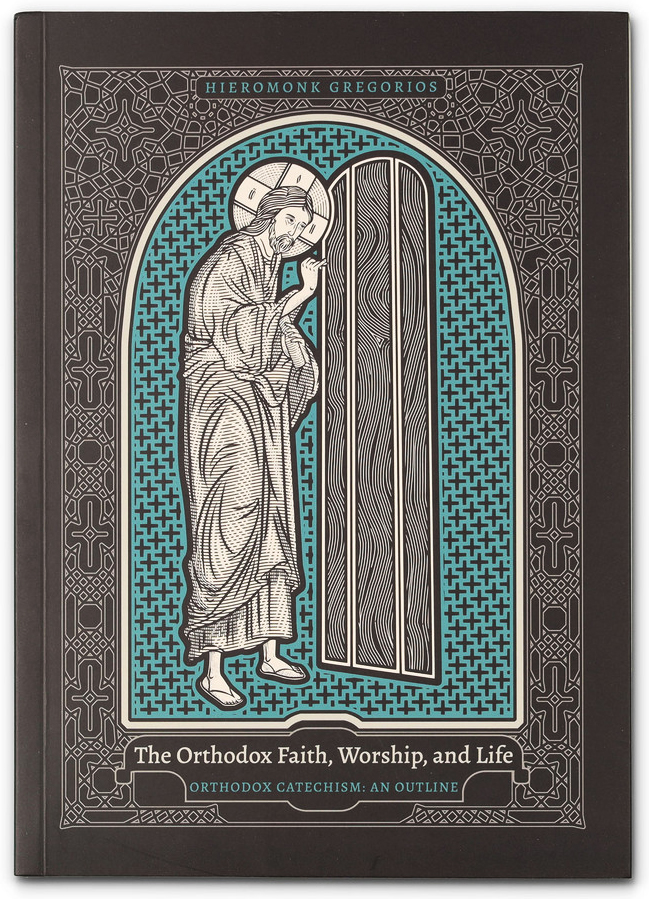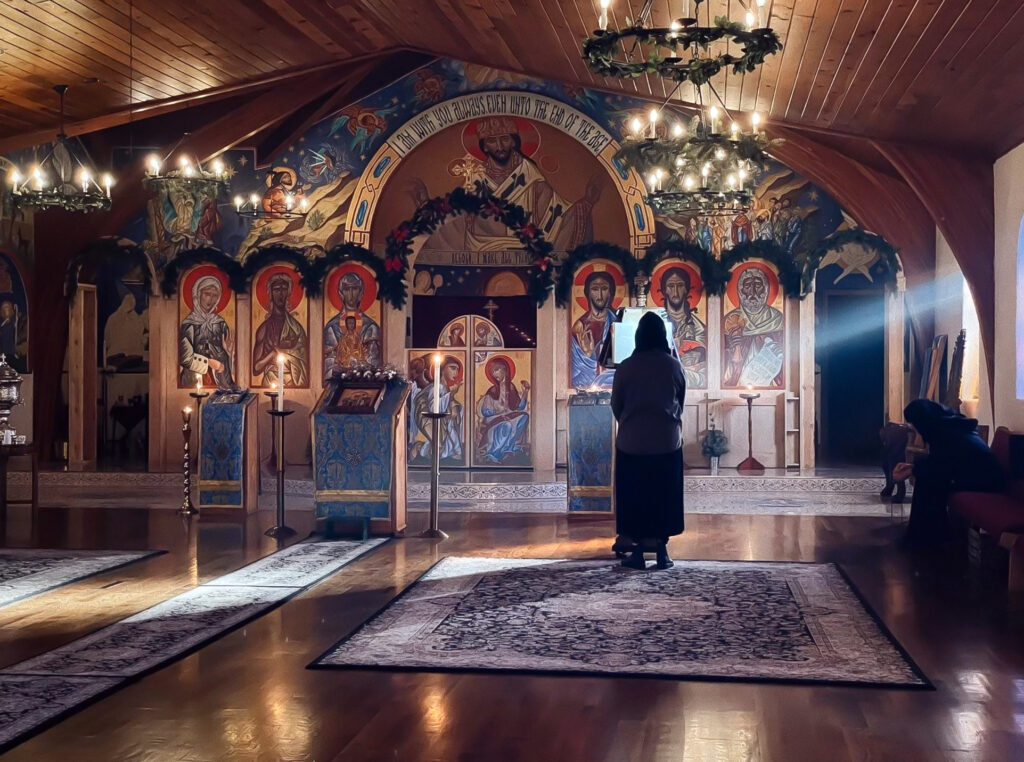“The Orthodox Faith, Worship, and Life: an Outline,” authored by Hieromonk Gregorios and translated by Chara Dimakopoulou, is an enlightening reading of the catechism of Eastern Orthodox Christianity. The book was published in 2020 by Newrome Press (320 pages ISBN 9781939028693). This book serves as both an introduction and a close look into the foundational beliefs, liturgical practices, and daily life that define the Orthodox faith. Drawing from his monastic experience and theological understanding, Hieromonk Gregorios presents a work accessible to both newcomers and practitioners alike.
From the Cell of St John the Theologian, Koutloumousiou Monastery, Mount Athos, this book was translated from their 2012 Greek edition, which was written to help those who are seeking a closer understanding of the faith, worship, and life of the Orthodox Church. The first part on faith includes sections on the Triune God, creation, the divine economy, the Mother of God, the Church and the Kingdom of God; the second part on worship describes the feasts, the church building, the Divine Liturgy and the Holy Mysteries of the Church; and the third part concludes with the Life in Christ: the era of the Old Testament, the era of Grace, prayer, asceticism and monasticism, the virtues, and the deification of man.
Outline
Three overall sections of the book inform the reader, catechumen and orthodox faithful. After a short introduction of several pages that define the catechism itself, its development, and its purpose, the book is structured into three primary sections, each covering areas of understanding Orthodox Christianity. These sections are:
- The Orthodox Faith: This section delves into the foundational beliefs and doctrines of the Orthodox Church. It covers topics such as the Nicene Creed, the nature of God, Christology, the Holy Spirit, and the Divine economy, the Holy Theotokos, The Holy Church, and the Kingdom of God. Hieromonk Gregorios provides a thorough exposition of these theological principles, explaining their historical development and significance in the life of the Church.
- Orthodox Worship: In this section, the rich liturgical traditions of the Orthodox Church are covered. Hieromonk Gregorios provides an in-depth look at the Divine Liturgy, the sacraments (holy mysteries), and the liturgical calendar, including feasts and fasts. The section emphasizes the importance of worship as a communal and transformative encounter with the divine, highlighting the theological and spiritual meanings behind various liturgical practices. Also presented is a thorough coverage of the Church’s importance of Iconography and Holy Relics. Further details are given for practical understanding and use to include liturgical vestments, books, and vessels.
- Orthodox Life: The final section focuses on the practical application of Orthodox faith and worship in daily life. That is, the life of Christ in the believer and what the specifics are about the faith and practice of Orthodoxity and what it means to each individual person. It covers aspects of personal spirituality, including prayer, fasting, almsgiving, asceticism, monastic life, the triad of virtues and their development, and finally, Theosis (the deification of man). Hieromonk Gregorios discusses how Orthodox Christians can live out their faith in contemporary society, to fulfill their spiritual obligations.
While the book informs the reader of Orthodoxy’s continuity and historical depth, it also traces its roots back to the early Church and the ecumenical councils. It is a book for Orthodox Christians who live by faith and practice according to foundational knowledge that sets the stage for Orthodox understanding and devotion.
You are outside Paradise, O catechumen; you share in the exile of our ancestor Adam. But now that the door is gradually opening to you, enter the Paradise which you left…
St. Gregory of Nyssa, To those who delay Baptism, PG 46.417CD-420C
Cast off the old man like a dirty garment, full of shame from multitudinous sins…. Accept the garment of corruption which Christ has unfolded and offers to you. Do not refuse the gift, so as not to insult the Giver.
Synthesis
“The Orthodox Faith, Worship, and Life” offers a comprehensive look at Eastern Orthodox Christianity, meticulously detailing its foundational beliefs, liturgical practices, and life in the Church. This book serves as an accessible and clear guide for both newcomers and faithful practitioners, drawing from the ancient traditions of the Orthodox Church. As Gregorios begins by laying the theological groundwork, he explains the historical context of the Orthodox faith and the authoritative significance of the Church, presenting them not merely as an ancient ethos of spiritual life but as a living declaration of faith that continues to unify and guide Orthodox parishes.
The Nicene Creed, as Gregorios explains, articulates the essential truths about the nature of God, Christ, and the Holy Spirit, and its recitation is a foundational grounding of Orthodox worship. He breaks down the Creed’s clear theological assertions into comprehensible elements, emphasizing how each statement encapsulates the divine mysteries that are central to Orthodox belief. This foundational understanding sets the backdrop for the book’s inquiry into the intricate relationship between theology and worship in Orthodox life.
Transitioning from doctrine to practice, Gregorios reaches into the vibrant liturgical life of the Orthodox Church. He offers a detailed overview of the Divine Liturgy, the central act of communal worship, highlighting its structure, symbolism, and theological support. Each component of the liturgy, from the hymns and prayers to the Eucharistic celebration, is considered for its role in uniting the faithful with God and each other. Gregorios emphasizes how these practices are not merely traditional but are seen as living encounters with the divine, meant to sanctify and elevate the participants’ lives.
In addition to the Divine Liturgy, Gregorios discusses the sacraments, or holy mysteries, of the Orthodox Church. He explains how these sacraments convey God’s grace and are integral to the spiritual life of believers. Baptism, Chrismation, Confession, Holy Communion, Marriage, Holy Orders, and Unction are each examined for their theological significance and practical application. Gregorios emphasizes that these sacraments are viewed as essential means of receiving divine grace and participating in the life of the Church.
Beyond worship, Gregorios also covers the daily expressions of the Orthodox faith. He writes about the importance of personal prayer, fasting, and the development of virtues, which are essential practices reinforcing the necessary elements of the faith. Monasticism is also discussed as a vital component of Orthodox spirituality, offering a model of intense dedication to prayer and asceticism. Gregorios presents these practices as ways to cultivate a deeper, more personal relationship with God while also contributing to the spiritual imperatives of the Church.
The book also delves into the Orthodox Church’s liturgical calendar, explaining the significance of the various feasts and fasts that structure the Orthodox year. Gregorios provides insight into how these observances commemorate key events in Christ’s and the saints’ lives, cultivating a sense of rhythm and continuity in believers’ spiritual lives.
A significant portion of the book is dedicated to explaining the role of icons in Orthodox worship and spirituality. Gregorios explains the theology behind the veneration of icons, explaining how they are viewed as windows to the divine, offering a tangible connection to the holy. He discusses the use of iconography and its doctrinal defense against Protestant objections concerning their veneration. Further consideration is given to created and uncreated grace as understood between Orthodoxy and the Roman Catholic Church. Further in the book, an additional explanation concerning Orthordoxy’s understanding of God’s essence and energy distinction provides clarity about why it is necessary to develop a right understanding of uncreated grace and how that has a bearing on personal Theosis—more specifically, the deification of man who participates in Divine energies as a means of eternal fellowship with the Triune God.
Gregorios explores how the Church’s teachings on love, charity, and justice are manifested in the lives of the faithful. He emphasizes the importance of church life in the Orthodox faith, where believers are encouraged to support and edify one another in their spiritual journeys.
Gregorios’s book is marked by a deep reverence for the subject matter and an authentic concern for the spiritual well-being of his readers. He combines historical and theological review with useful facts for the development of catechumens, making complex concepts clear and relevant to contemporary life. His approach ensures that readers not only gain a clear understanding of Orthodox Christianity but also see its application in their own spiritual walk.
In conclusion, “The Orthodox Faith, Worship, and Life” by Hieromonk Gregorios is a very beneficial resource for anyone seeking to understand the depth and beauty of Eastern Orthodox Christianity. Through its detailed exploration of theology, worship, and daily practice, the book offers a comprehensive guide to the Orthodox way of life. Gregorios’s informative and clear writing invites readers to delve into the rich traditions of Orthodoxy, encouraging them to appreciate its profound spiritual heritage and to integrate its practices into their own lives. This work stands as a testament to the enduring vitality of the Orthodox faith and its necessity in a world in desperate need of faith, hope, and love.
Author
Archimandrite Gregorios Hatziemmanouil was born on the Greek island of Mytilene and studied theology at the University of Athens, with postgraduate studies in patristic theology at the University of Strasbourg. He was tonsured a monk at the Monastery of St John the Theologian in Mytilene in 1966 and shortly afterward was ordained into the priesthood. In the same year, he joined the monastic community of Mount Athos and is presently the Elder of the small brotherhood of the Cell of St John the Theologian, Koutloumousiou Monastery. He has been a spiritual elder and confessor since 1971 in which capacity he periodically travels throughout Greece and to Germany.
He has written several influential works, including “The Mystery of Marriage: A Fellowship of Love,” which explores the spiritual and sacramental aspects of marriage. He is also known for his commentary on the Divine Liturgy, providing insights into the Orthodox Christian faith and worship. In addition to The Divine Liturgy, his other full-length studies and commentaries (in Greek) include Holy Baptism, Holy Confession; Holy Thanksgiving and Holy Communion, Church, and Church Attendance, and St John the Evangelist, and he has also published numerous articles and booklets.















Comments are closed.